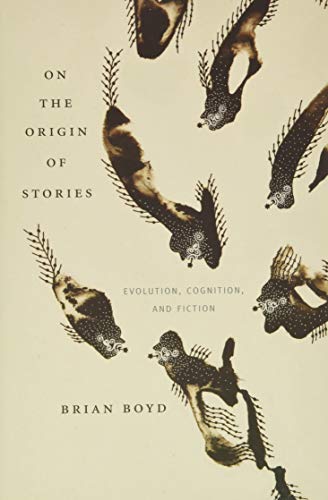Items related to On the Origin of Stories: Evolution, Cognition, and...

Synopsis
A century and a half after the publication of Origin of Species, evolutionary thinking has expanded beyond the field of biology to include virtually all human-related subjects―anthropology, archeology, psychology, economics, religion, morality, politics, culture, and art. Now a distinguished scholar offers the first comprehensive account of the evolutionary origins of art and storytelling. Brian Boyd explains why we tell stories, how our minds are shaped to understand them, and what difference an evolutionary understanding of human nature makes to stories we love.
Art is a specifically human adaptation, Boyd argues. It offers tangible advantages for human survival, and it derives from play, itself an adaptation widespread among more intelligent animals. More particularly, our fondness for storytelling has sharpened social cognition, encouraged cooperation, and fostered creativity.
After considering art as adaptation, Boyd examines Homer’s Odyssey and Dr. Seuss’s Horton Hears a Who! demonstrating how an evolutionary lens can offer new understanding and appreciation of specific works. What triggers our emotional engagement with these works? What patterns facilitate our responses? The need to hold an audience’s attention, Boyd underscores, is the fundamental problem facing all storytellers. Enduring artists arrive at solutions that appeal to cognitive universals: an insight out of step with contemporary criticism, which obscures both the individual and universal. Published for the bicentenary of Darwin’s birth and the 150th anniversary of the publication of Origin of Species, Boyd’s study embraces a Darwinian view of human nature and art, and offers a credo for a new humanism.
"synopsis" may belong to another edition of this title.
About the Author
Brian Boyd, University Distinguished Professor in the Department of English, Drama and Writing Studies, University of Auckland, is the world’s foremost authority on the works of Nabokov.
"About this title" may belong to another edition of this title.
- PublisherBelknap Press: An Imprint of Harvard University Press
- Publication date2010
- ISBN 10 0674057112
- ISBN 13 9780674057111
- BindingPaperback
- LanguageEnglish
- Number of pages560
- Rating
US$ 3.75 shipping within U.S.A.
Destination, rates & speedsSearch results for On the Origin of Stories: Evolution, Cognition, and...
On the Origin of Stories: Evolution, Cognition, and Fiction
Seller: HPB-Red, Dallas, TX, U.S.A.
Paperback. Condition: Good. Connecting readers with great books since 1972! Used textbooks may not include companion materials such as access codes, etc. May have some wear or writing/highlighting. We ship orders daily and Customer Service is our top priority! Seller Inventory # S_390993679
Quantity: 1 available
On the Origin of Stories: Evolution, Cognition, and Fiction
Seller: SecondSale, Montgomery, IL, U.S.A.
Condition: Good. Item in good condition. Textbooks may not include supplemental items i.e. CDs, access codes etc. Seller Inventory # 00087998639
Quantity: 2 available
On the Origin of Stories: Evolution, Cognition, and Fiction
Seller: SecondSale, Montgomery, IL, U.S.A.
Condition: Very Good. Item in very good condition! Textbooks may not include supplemental items i.e. CDs, access codes etc. Seller Inventory # 00084607812
Quantity: 1 available
On the Origin of Stories : Evolution, Cognition, and Fiction
Seller: Better World Books, Mishawaka, IN, U.S.A.
Condition: Very Good. Former library book; may include library markings. Used book that is in excellent condition. May show signs of wear or have minor defects. Seller Inventory # 13267196-6
Quantity: 1 available
On the Origin of Stories : Evolution, Cognition, and Fiction
Seller: Better World Books, Mishawaka, IN, U.S.A.
Condition: Very Good. Used book that is in excellent condition. May show signs of wear or have minor defects. Seller Inventory # 6000248-6
Quantity: 1 available
On the Origin of Stories: Evolution, Cognition, and Fiction
Seller: Friends of Pima County Public Library, Tucson, AZ, U.S.A.
Condition: Good. Paperback. NOT Ex-library. Good condition. Slight edgewear. Clean pages and tight binding. Until further notice, USPS Priority Mail only reliable option for Hawaii. Proceeds benefit the Pima County Public Library system, which serves Tucson and southern Arizona. G24. Seller Inventory # 529WDE000D12
Quantity: 1 available
On the Origin of Stories: Evolution, Cognition, and Fiction
Seller: Textbooks_Source, Columbia, MO, U.S.A.
paperback. Condition: Good. Reprint. Ships in a BOX from Central Missouri! May not include working access code. Will not include dust jacket. Has used sticker(s) and some writing or highlighting. UPS shipping for most packages, (Priority Mail for AK/HI/APO/PO Boxes). Seller Inventory # 001042514U
Quantity: 2 available
On the Origin of Stories : Evolution, Cognition, and Fiction
Seller: GreatBookPrices, Columbia, MD, U.S.A.
Condition: good. May show signs of wear, highlighting, writing, and previous use. This item may be a former library book with typical markings. No guarantee on products that contain supplements Your satisfaction is 100% guaranteed. Twenty-five year bookseller with shipments to over fifty million happy customers. Seller Inventory # 8847041-5
Quantity: 2 available
On the Origin of Stories: Evolution, Cognition, and Fiction
Seller: BookHolders, Towson, MD, U.S.A.
Condition: Good. [ No Hassle 30 Day Returns ][ Ships Daily ] [ Underlining/Highlighting: NONE ] [ Writing: NONE ] [ Edition: Reprint ] Publisher: Belknap Press of Harvard University Press Pub Date: 11/15/2010 Binding: Paperback Pages: 560 Reprint edition. Seller Inventory # 6874228
Quantity: 1 available
On the Origin of Stories: Evolution, Cognition, and Fiction
Seller: SatelliteBooks, Burlington, VT, U.S.A.
paperback. Condition: Very Good. Softcover. Very Good condition. Free of any markings and no writings inside. Clear Text. Minor shelf-wear. For any additional information or pictures, please inquire. Seller Inventory # 250420003
Quantity: 1 available

